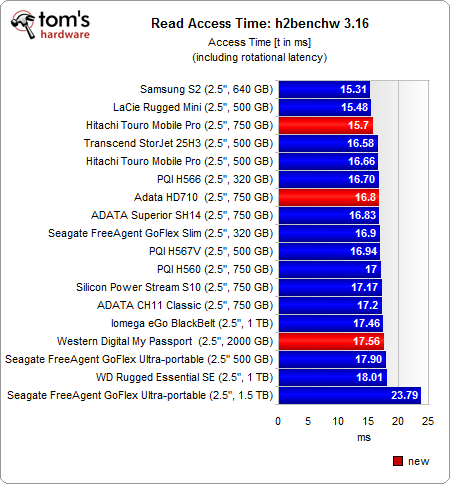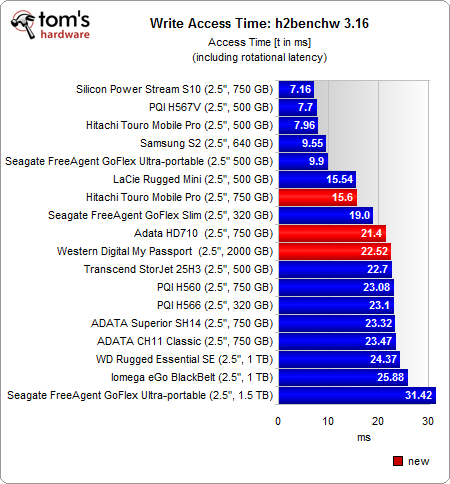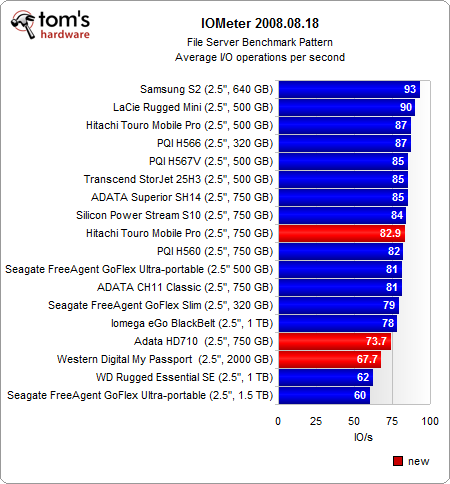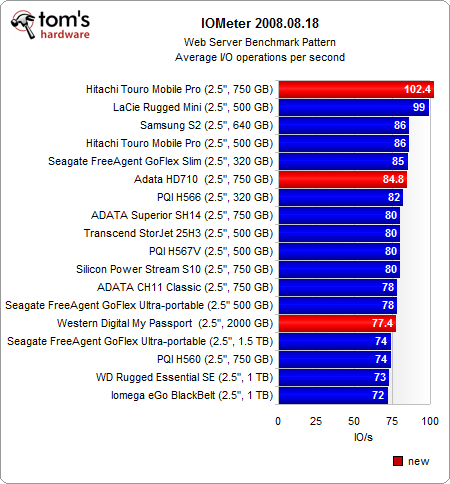USB 3.0-Based 2.5" Hard Disks From Adata, Hitachi, And WD
USB 3.0 allows external hard drives to realize their performance potential. Each of the three external USB 3.0-based 2.5” disks we're reviewing also excels in some other discipline. We study these specialties up close: speed, capacity, and durability.
Benchmark Results: Access Time And I/O Performance
Among today's three contenders, access times vary by only seven milliseconds. That's small enough to not affect the test results by much.
There is a notable performance difference between the Hitachi drive, on one hand, and the Adata and Western Digital drives, on the other. The Iometer benchmarks demonstrate this. In the file server and Web server workloads, Hitachi's Touro Mobile Pro outclasses its competition. Adata's DashDrive Durable HD710 and Western Digital's My Passport occupy a lower performance echelon, finishing close together and challenging each other for second place among our three candidates.
Despite the Touro's strong showing in these two charts, however, the results are only marginally relevant. External USB 3.0-based disk drives aren't designed for I/O-heavy tasks. So, it's less likely that you'd replicate these numbers than the sequential benchmark figures on the previous page.
Real-world results would be even better. On the next page, we'll dig into what these drives are really meant to do: copying files.
Get Tom's Hardware's best news and in-depth reviews, straight to your inbox.
Current page: Benchmark Results: Access Time And I/O Performance
Prev Page Benchmark Results: Throughput And Interface Bandwidth Next Page Benchmark Results: Real-World Copying-
alidan how fast is usb3? i mean real world, say you put a ssd in the best enclosure, what would it do?Reply -
thezooloomaster alidanhow fast is usb3? i mean real world, say you put a ssd in the best enclosure, what would it do?Reply
The theoretical bandwidth of USB 3.0 is roughly 625 MB/s, but this speed is rarely achieved -- even with the fastest hardware -- because the bus relies on a protocol for transferring data which is poorly optimized and eats up a chunk of the bandwidth. -
shahrooz alidanhow fast is usb3? i mean real world, say you put a ssd in the best enclosure, what would it do?I get like 70~140 MB/s (copying from WD my passport 1TB to my WD HDD (7200rpm black))Reply
and I get 30~40 MB/s copying from USB 2 WD my book 2TB to ^^^^^^^^^^^^^^^ -
willyroc shahroozI get like 70~140 MB/s (copying from WD my passport 1TB to my WD HDD (7200rpm black))and I get 30~40 MB/s copying from USB 2 WD my book 2TB to ^^^^^^^^^^^^^^^USB 3 is more than twice as fast as USB 2.Reply -
tridon I'm sitting here, daydreaming about a Velociraptor external drive. Maybe that would be able to use the USB 3's capacity better, or maybe something's slightly wrong in my head for wishing for such a thing.Reply -
ojas willyrocUSB 3 is more than twice as fast as USB 2.Yeah but you're still limited to both the source and destination drive's read/write speed. So when copying from a HDD to an HDD, you're unlikely to exceed 140 MBps.Reply
If you're copying from a SATA 3 SSD to a USB 3.0 SSD, then yes, you could see much faster speeds. -
jaquith USB 3.0 + UASP (or) eSATA (or) Internal (SATA 2 or 3) HDD.Reply
USB 3.0 in most instances isn't ready for prime time for external HDD's, and without UASP the queuing is too slow; UASP solves this problem. Otherwise without UASP IMO use eSATA or a backup internal SATA HDD.
More info see TH article June 20th, 2012 - http://www.tomshardware.com/reviews/usb-3-uas-turbo,3215.html
Note: The Hitachi Touro fails (BSOD) in Windows 8. -
ubercake So... Theoretically USB 3.0 is faster than eSata, but in practice eSata is still the way to go?Reply -
LukeCWM ubercakeSo... Theoretically USB 3.0 is faster than eSata, but in practice eSata is still the way to go?Yes.Reply -
alidan shahroozI get like 70~140 MB/s (copying from WD my passport 1TB to my WD HDD (7200rpm black))and I get 30~40 MB/s copying from USB 2 WD my book 2TB to ^^^^^^^^^^^^^^^Reply
that 1tb is in a better case than the 2tb
what i have noticed with usb 3 is that, yes while its theoretical max is higher than current hdd and ssds should achieve, the fact of the matter is they never hit that peak.
thats why im wondering, with an ssd, what is the best we can get usb3 to.
you proved that current normal hdds in a good case do not have a problem in usb 3, and for that i thank you.



